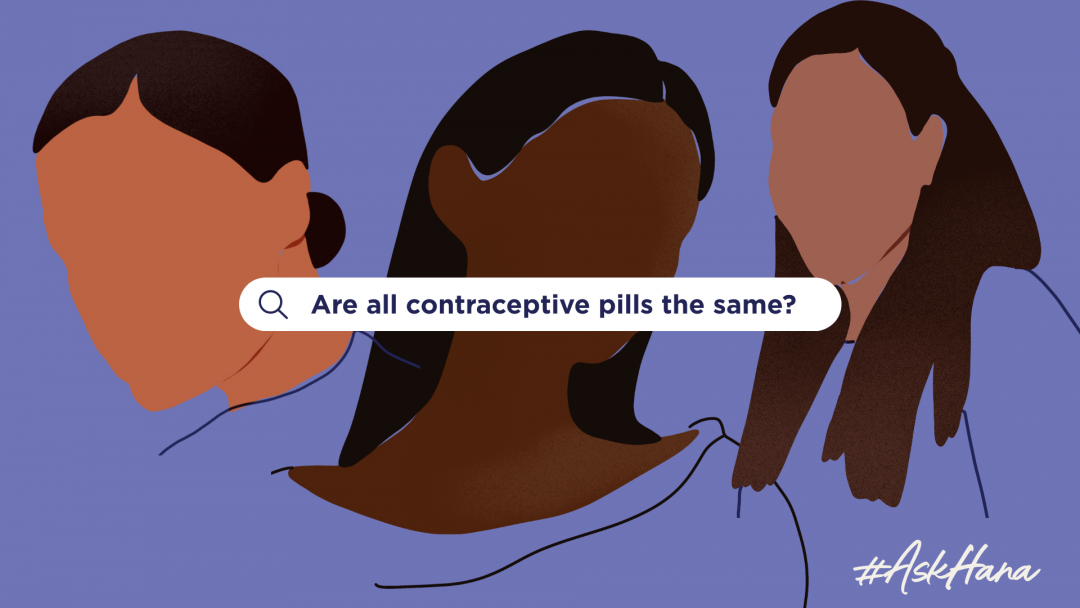How much do you think you know about contraceptive pills? If you’re taking a contraceptive pill to help prevent pregnancy, do you know which one you’re taking? If you’re not sure, you’re not alone. In a 2021 survey we carried out with almost 1,000 respondents, we found that almost 6% of people who take a contraceptive pill as their contraceptive method are not sure which pill they take.
In another survey conducted in 2021, we found that almost 43% of respondents incorrectly thought that the combined contraceptive pill is also called the ‘mini pill’, which may mean that if they were prescribed the mini pill they wouldn’t be sure which contraceptive pill they were actually using.
At Hana® we think it’s really important to know how contraception works and how it affects your body, so you can feel empowered and in control of your contraceptive choices. That’s why we created our Ask Hana series, to answer common queries and concerns about contraception.
So are all contraceptive pills the same, and if not what types are there? Read on to find out.
Differences Explained
Calling contraceptive pills ‘the pill’ can be a bit misleading, because there are actually two main types of contraceptive pills and then within these sub-categories different pills may use different active ingredients to help prevent pregnancy.
The two types of contraceptive pills available are the combined contraceptive pill and the progestogen-only pill. The combined contraceptive pill contains both progestogen and oestrogen, and it works to consistently prevent ovulation. You generally take the combined pill every day for 21 days of your cycle, and then take a break, or inactive pills, for 7 days.
The progestogen-only pill (sometimes known as the mini pill) contains a synthetic version of the hormone progesterone called progestogen. It does not contain oestrogen (which is why it’s called progestogen-only) and so it can be suitable for people who cannot or do not want to take oestrogen. This type of pill works by thickening your cervical mucus, which makes it difficult for sperm to travel to the egg. When the active ingredient used is a progestogen called desogestrel, it also helps prevent ovulation so no egg is released and the sperm has nothing to fertilise. These pills should be taken every single day at the same time without a break between packs
Hana® is a progestogen-only contraceptive pill available to buy over the pharmacy counter or online with no need for a doctor’s appointment. Find out more about Hana® here.
When taken correctly, both combined contraceptive pills and progestogen-only pills are over 99% effective at preventing pregnancy.
Find the Best Pill for You
Different contraceptive pills have different effects on different people, and what works for one person may not work for another. Some people find they may have to try a few different contraceptive methods until they find something which feels right for them.
Both types of contraceptive pills are tolerated by many people, but there are a few things to consider. The combined contraceptive pill cannot be used by some women and people with uteruses for medical reasons, such as being over 35 years old and a smoker, or with a high body mass index (BMI). Combined contraceptive pills are also not suitable if you have a history of blood clots, or if you are allergic to or do not want to take oestrogen. For those people, a progestogen only pill might be more suitable as they do not contain oestrogen.
The combined contraceptive pill also cannot be taken by people who are breastfeeding, whilst the progestogen-only pill can be used by those who are breastfeeding.
Combined contraceptive pills are only available with a doctor’s prescription, whilst some progestogen-only contraceptive pills containing desogestrel, like Hana®, are available over the pharmacy counter with no need for a doctor’s appointment. This may be an important factor for people who don’t feel they have the time to – or simply don’t want to – wait for a doctor’s appointment. Click here if you want to see whether Hana® could be suitable for you.
Whilst Hana® is usually well tolerated by many women and people with uteruses, it would not be suitable if:
- You are allergic to desogestrel or any other ingredients in Hana®, if you have cancer, such as certain types of breast cancer, ovarian cancer or endometrial (uterine) cancer.
- You have, or have had, jaundice (yellowing of the skin or whites of the eyes) or severe liver disorders, and blood tests show your liver has not returned to normal.
- You have an active blood clot in the legs (deep vein thrombosis) or lungs (pulmonary embolism).
- You have unexplained bleeding between periods or after sex (you should check this out with a doctor as it can be a symptom of more serious problems).
- If you are pregnant or think you may be pregnant.
When considering a new contraceptive pill, you should talk to your doctor or pharmacist about any medications and current or previous medical conditions you may have or have had, so they can help you make the right choice for you.
We hope this has answered your question and you now feel more empowered in your knowledge of contraception pills! Check out Ask Hana for other informative articles about contraceptive pills, and let us know if you have a question we haven’t answered on social @hanapilluk.


